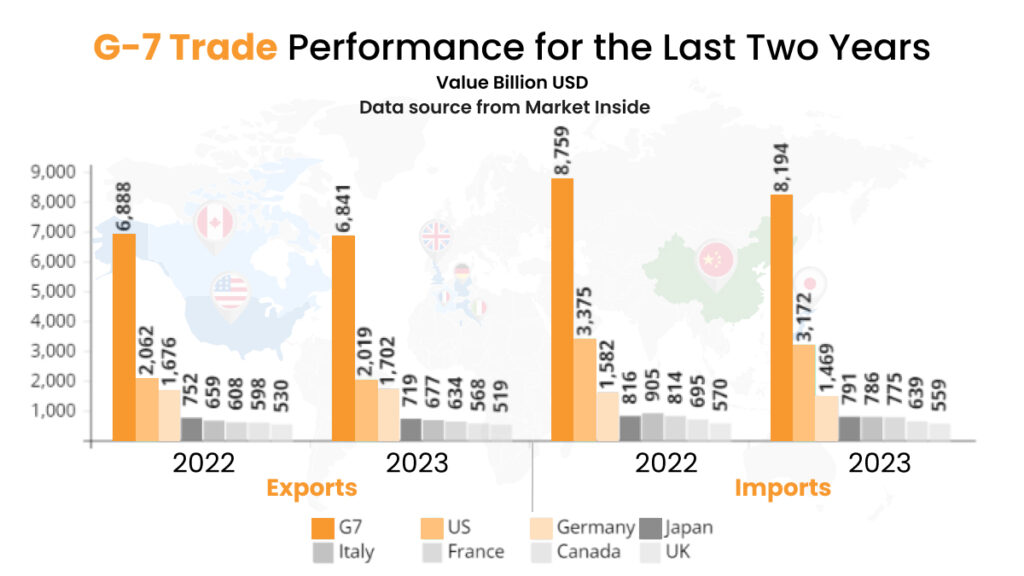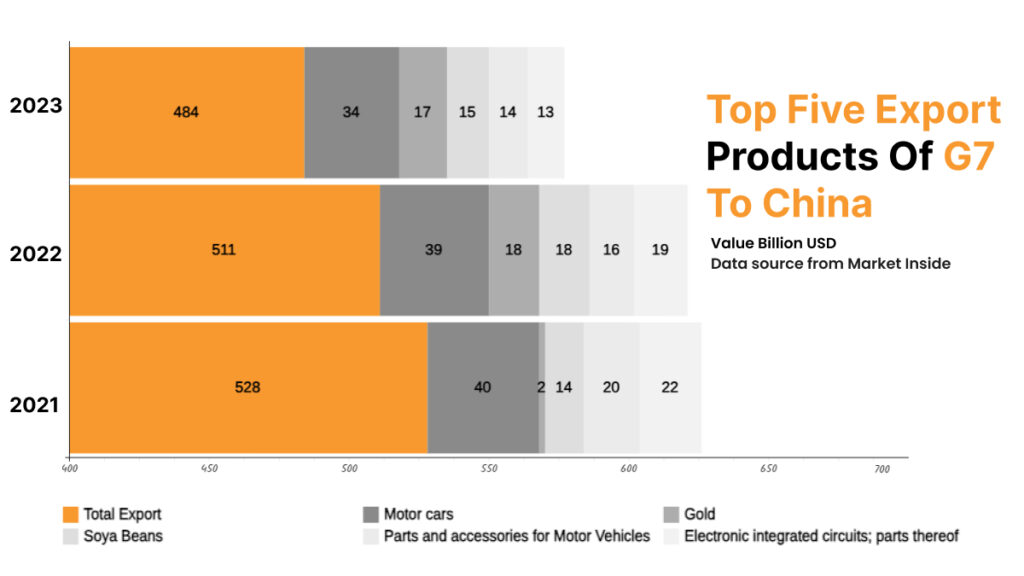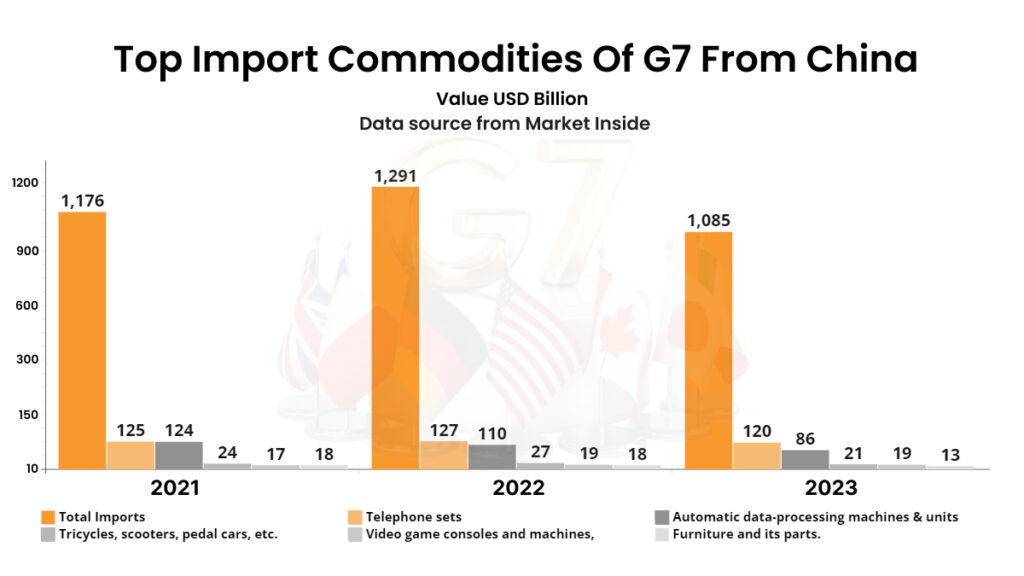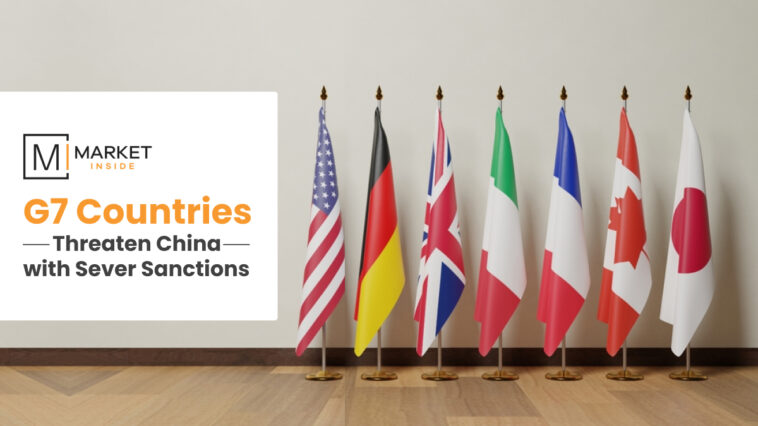Key Insights
- G7 as a trade bloc controls around 41% of the global merchandise trade.
- The US and Germany are the only ones whose export value crossed the mark of $2 and $1.7 trillion, respectively, in 2023.
- Bilateral trade between G7 and China denotes the decline in imports of $205 billion from 2022 to 2023.
Recently, the world’s most advanced trade bloc, G7 held a meeting in Italy, contributing to 41% of the global merchandise trade. During the G7 members have made it clear that they will promote the work of IMEC (India-Middle-East- Economic Corridor), food security, and focus on infrastructure investment.
Despite their effort to establish a stable and prosperous global trading environment, the members of the G7 took strong steps against China. They warned to impose economic sanctions for supporting Russia through dual-used material.
Let’s explore with this blog what happens when the G7 countries start a trade war with China and also understand the effect on global trade and the potential disruption in the supply chain worldwide.
How Big Is G7?
G7 as a trade bloc controls around 41% of the global merchandise trade. The total exports and imports values are trade-in trillions of dollars. Explore the trade performance of the G7 countries for the last two years from 2022 to 2023.
Notably, exports and imports have marginally declined by $47 and $565 billion, respectively from 2022 to 2023. The US and Germany are the only ones whose export value crossed the mark of $2 and $1.7 trillion, respectively, in 2023. All the G7 Countries face a trade deficit. It means their total export values are lesser than their import values. For instance, The US economy struggled with a massive trade deficit of 1.1 trillion dollars in 2023. Among the G7 countries, Germany emerged as the only country enjoying a trade surplus of 233 billion dollars in the same period.

| Countries | Exports | Imports | ||
|---|---|---|---|---|
| 2022 | 2023 | 2022 | 2023 | |
| G7 | 6888 | 6841 | 8759 | 8194 |
| US | 2062 | 2019 | 3375 | 3172 |
| Germany | 1676 | 1702 | 1582 | 1469 |
| Japan | 752 | 719 | 816 | 791 |
| Italy | 659 | 677 | 905 | 786 |
| France | 608 | 634 | 814 | 775 |
| Canada | 598 | 568 | 695 | 639 |
| UK | 530 | 519 | 570 | 559 |
How Does Sanction Affect the Bilateral Trade Between G7 and China?
Both G7 countries and China, are the crucial player in the international trade area, controlling the supply chain network. But, recently, trade relations between China and the G7 members are continuously deteriorating and hampering the exporters and importers globally. Further, G7 members have also warmed China with strong sanctions. Before discussing the impact of sanctions, let’s explore the trade performance.
Remarkably, G7 country’s trade with China is continuously declining from 2021 to 2023, during this period, the exports from G7 to China decreased by $117 billion or by 8.3%. Among the top export commodities to China are motor cars, Gold, and Soya beans, the top products that stood at $34, $17, and $15 billion in 2023.

| Commodities | 2021 | 2022 | 2023 |
| Total Export | 528 | 511 | 484 |
| Motor cars | 40 | 39 | 34 |
| Gold | 0.2 | 18 | 17 |
| Soya Beans | 14 | 18 | 15 |
| Parts and accessories for Motor Vehicles | 20 | 16 | 14 |
| Electronic integrated circuits; parts thereof | 22 | 19 | 13 |
Bilateral trade between G7 and China denotes the decline in imports of $205 billion from 2022 to 2023. This decline in trade performance shows that the weakening of trade is not a new phenomenon, but was boosted in a recent G7 meeting held in Italy. Let’s explore the top commodities that G7 countries import from China. Here’s a quick view of this –
Among the top import commodities, telephone sets, automatic data processing machines, and units are the most imported products by G7 countries from China with values of 120 and 86 billion, respectively, in 2023. On the other hand, the import of Furniture and its parts declined by around 28% in the same period.

| Commodities | 2021 | 2022 | 2023 |
| Total Imports | 1176 | 1291 | 1085 |
| Telephone sets | 125 | 127 | 120 |
| Automatic data-processing machines & units | 124 | 110 | 86 |
| Tricycles, scooters, pedal cars, etc. | 24 | 27 | 21 |
| Video game consoles and machines | 17 | 19 | 19 |
| Furniture and its parts | 18 | 18 | 13 |
The bilateral trade between China and the members of the G7 is deteriorating, and fresh sanctions may further escalate the trade tension. This may badly affect the local manufacturers as well as international business. — Let’s understand how sanctions affect businesses –
What Are the Effects of Sanctions?
Delay in Transportation –
There is no doubt that sanctions create barriers to the free movement of goods between countries, resulting in shortages, increases in the price of goods, and delays in shipments. Businesses associated with China and G7 will need help to connect with new suppliers for their goods needs.
Global Economic Slowdown –
Sanctions imposed on China by G7 countries may trigger China to opt for retaliatory measures to counter sanctions. In this case, it will lead to a trade war, and could potentially trigger a global economic slowdown.
Impact On Industry –
The impact of sanctions would be more on specific industries compared to the whole industry. For instance, G7’s manufacturing and technology sector heavily relies on China, and has the potential to restrict technology transfer and could hinder production.
Sanctions imposed by G7 members on China could bring the world to the edge of a trade war. However, this sanction may put the world economy toward a global slowdown. Hence, It becomes important for world leaders to prepare for the trade war with alternative options or they can present a better platform for negotiation.




